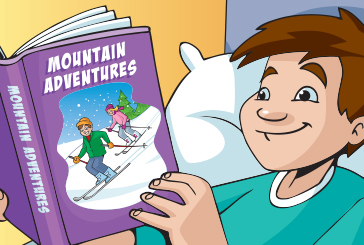 Karen Saxby is the author of the Storyfun series, published by Cambridge University Press. She also co-wrote the Fun For series, and is an experienced Cambridge Assessment English consultant. In this article, she explores how stories can be used to make young people's language learning meaningful and memorable.
Karen Saxby is the author of the Storyfun series, published by Cambridge University Press. She also co-wrote the Fun For series, and is an experienced Cambridge Assessment English consultant. In this article, she explores how stories can be used to make young people's language learning meaningful and memorable.
As a child, I loved sitting on my grandfather's lap while he read me stories. I remember most of them even though I am now a grandparent, too! As a child, I was blissfully unaware that, as I listened to the stories, I was also learning new words and ways in which those new words combined to communicate ideas and life lessons.
A good story encourages us to turn the next page and read more. We want to find out what happens next and what the main characters do and what they say to each other. We may feel excited, sad, afraid, angry or really happy. This is because the experience of reading or listening to a story is much more likely to make us 'feel' that we are part of the story, too. Just like in our 'real' lives, we might love or hate different characters in the story. Perhaps we recognise ourselves or others in some of them. Perhaps we have similar problems.
Because of this natural empathy with the characters, our brains process the reading of stories differently from the way we read factual information. Our brains don't always recognise the difference between an imagined situation and a real one so the characters become 'alive' to us. What they say and do is therefore more meaningful. This is why the words and structures that relate a story's events, descriptions and conversations are processed in this deeper way.
In fact, cultures all around the world have always used storytelling to pass knowledge from one generation to another. Our ancestors understood very well that this was the best way to make sure our histories and information about how to relate to others and to our world was not only understood, but remembered too. (Notice that the word ‘history’ contains the word ‘story’ – More accurately, the word ‘story’ derives from ‘history’.)
Encouraging your child to read or listen to stories should therefore help them to learn a second language in a way that is not only fun, but memorable.
Let's take a quick look at learning vocabulary within a factual text or within a story. Imagine the readers are eight-year-olds interested in animals. In your opinion, are they more likely to remember AND want to continue reading the first or second text?
Many birds and animals live in the world, for example, parrots, pandas, lions, leopards and rabbits. In the sea we can find whales, dolphins, sharks and octopuses.
My younger brother is called Fred. Fred's very interested in animals. He talks and asks questions about animals ALL the time! Fred's really interested in parrots and pandas and lions and leopards and rabbits. But Fred's favourite animals live in the sea. He has pictures of whales, dolphins, sharks and octopuses on all the walls of his bedroom.
From: Do whales have stomach aches? (Storyfun for Movers, Cambridge University Press, 2011).
When choosing second language story books, you might consider questions like:
- Will your child easily identify with the central characters? Are they of similar ages for example?
- Will the events interest and excite, scare or amuse your child enough to motivate them to continue reading?
- Is the story an appropriate length – not too short, not too long?
- Will the layout – the font, the titles, the amount of text on each page – appeal to your child?
- Is it supported by illustrations that your young reader will enjoy looking at?
For your child to gain the maximum benefit and language learning from reading stories, consider the story's language level carefully, too. Is the grammar and vocabulary not too easy but still accessible to the reader? Would the language be similar to that which your child might use in their first language? Would it support school work and help prepare for tests? Useful EFL publications such as Storyfun for Starters, Movers and Flyers and other graded readers are carefully written with these important considerations in mind.
But, of course, stories don't only offer the young reader a chance to read. The experience also creates an opportunity to talk about the story. As a parent, you can encourage your child to describe their favourite person, part of the story or picture. Their creativity might be developed by drawing new story pictures or even by writing their own short stories as a result.
If your child is reluctant to read or has little confidence in their ability to read in another language, you might help them by reading the story to them, stopping where necessary to interact and ask questions like 'What do you think will happen next?' If you read to your children in a relaxed and fun way, they will subconsciously relate to the reading and language learning process more confidently and positively. Of course, being read to by a parent, for whatever reason, is also simply a lovely way to share quiet and close time.
The experience of reading or listening to a story allows us to escape our own lives for a moment and live in another one in a fun and safe way. In the same magical experience, a goldmine of language may be learned, so do encourage your child to read stories in their second language as well as their first!